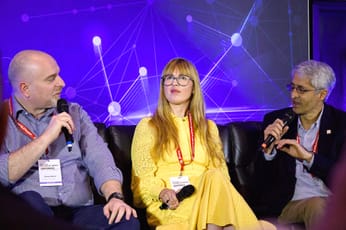Brighton and Hove: becoming an open data, collaborative city
I’m at the Open Data Cities conference all day. And this is the opening session:
Sadly, John Barradell, chief executive of Brighton and Hove City Council isn’t with us, as he’s sick. He’s got stand ins: Charlie Stewart, strategic director and John Shewell, head of communications at Brighton and Hove City Council.
John:
Busy week: 3rd Brighton marathon last weekend. This conference comes at an important time for public services. We’re at an interesting change – not just in the UK, but across the globe. The future of local government – and how opening up public data – can nudge people into opening up about what’s important to them. That’s our goal: connecting the city with the place. Inovolving people in design and delivery of public services.
It’s an iterative process – a journey that will continue for years to come. In May, we’ll have the Brighton festival, which has become one of the great cultural festivals of the world. It was proposed in 1964, and was first held in 1967. It’s brought together by collaborate – private and public, community groups and cities. It gets more ambitious every year – the spirit of the city. Collaboration works. It reaches into every part of the city – from schools to housing estates. That sort of collaboration lies at the heart of open data cities.
The concept of cities as systems: harnessing human and social capital, with infrastructure, to fuel sustainable economic development and a high quality of life. Democracy really matters – not just at elections, but a conversation every day. Open data is part of that process.
750,000 people are members of a political organisation. 7.5m want to be more involved in decisions that effect their lives. The challenges is in finding ways of allowing that that suit them. This is about creating a democratic organisation; one that is open to discussion and scrutiny, and which is accountable. It needs to protect the functions of the state we value the most, while allowing more social action. We need to understand the difference between the state as provider and the role of arbitrating democratically between equally valid needs. The second role is connecting the citizens: facilitating dialogue so we can shape the future together. We need to create space to allow those conversations to happen.
How do we unlock data so citizens han influence decisions before they’re made? There is a golden triangle:
- public serives
- citizens
- innovation
We want to connect these to create a healthier city. We want to cede control to citizens in return for active collaboration. It’s as much a shift in attitude as the way we want to work.
Companies as ecosystems, not as top down machines. Strong values. Responsive to needs of customers. These are the principles we feel are right for the city council.
Charlie:
Two years into a change process at the council. It’s not finished – and it may never be: it’s a journey. The main aim is to bring the council closer to the community. They’ve been involved in initiative alike CityCampyBrighton. Another project is Patchwork: using social media to join up professionals to support families. They’re trying to work collaboratively across agencies. The worked with practitioners to design an app allowing the agencies to see who is involved with which family.
We Live Here – building systems using traditional and new media, and the basis for neighbourhood councils.
Beside sthe publication of various data sets on the website, there’s the Brighton and Hove Local Information Service (BHLis), for use of everyone across the city. They want to improve their transparency and therefore their accountability. There at the start of a journey, to become a curator of the city’s needs and data, and to work with all organisations in the city to improve the outcomes. It’s about loose connections and networked organisations.
They need to move beyond FoI requests to really accessible datasets.
Sign up for e-mail updates
Join the newsletter to receive the latest posts in your inbox.












